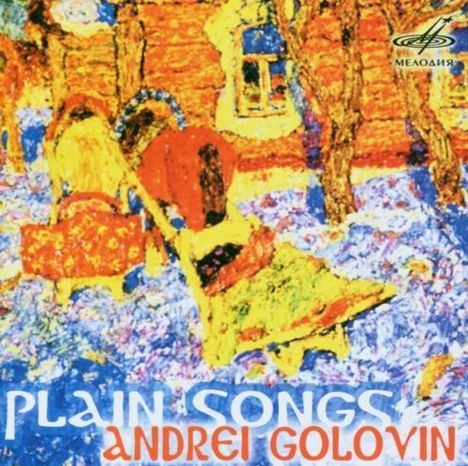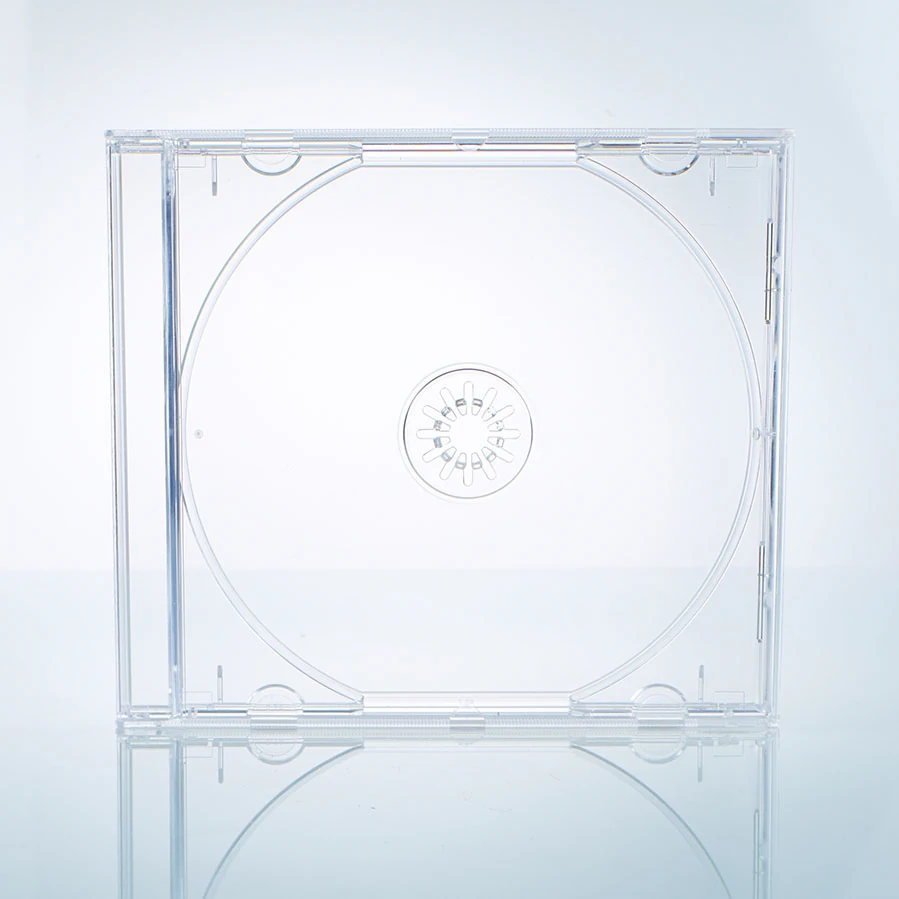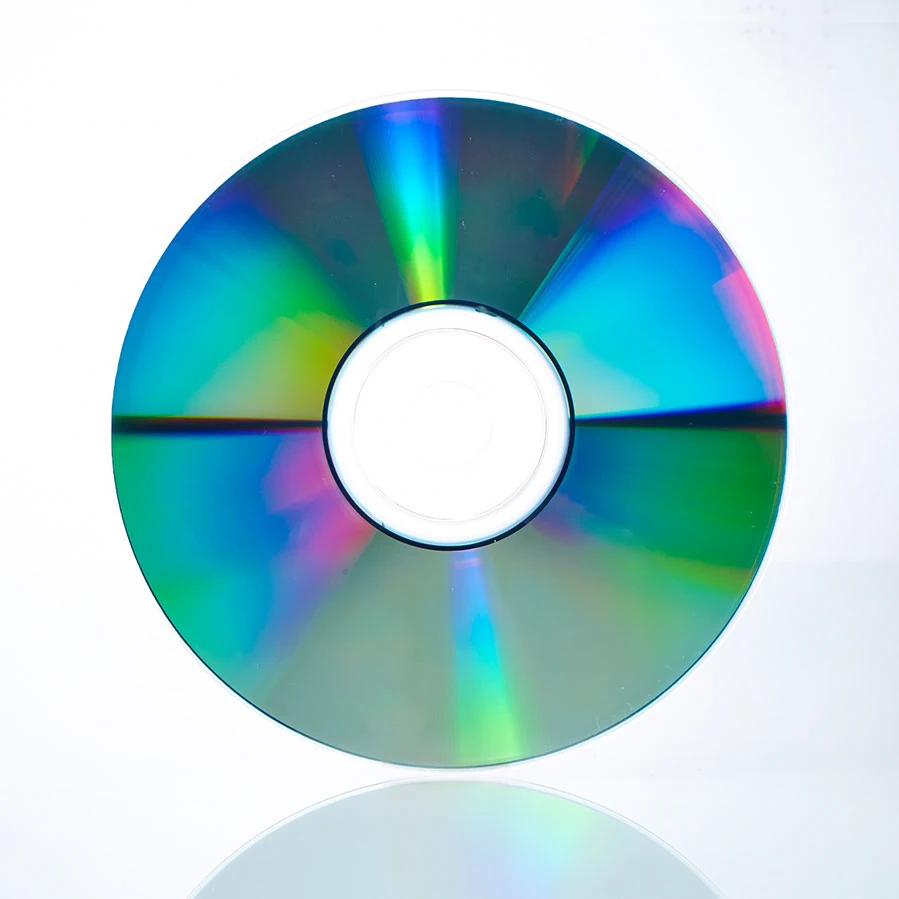Andrei Golovin: Plain Songs auf CD
Plain Songs
Herkömmliche CD, die mit allen CD-Playern und Computerlaufwerken, aber auch mit den meisten SACD- oder Multiplayern abspielbar ist.
(soweit verfügbar beim Lieferanten)
+Elegy für Cello solo; Music for Strings; Distand Past
- Künstler:
- A. Golovin, Rudin, Zhukov, Moscow Chamber Orchestra, Svetlov
- Label:
- Melodiya
- Aufnahmejahr ca.:
- 1990-02
- Artikelnummer:
- 4569246
- UPC/EAN:
- 4600317008537
- Erscheinungstermin:
- 18.11.2013
Product Information
Andrei Golovin was born in Moscow in 1950. In 1976 he graduated from Moscow Conservatoire where he studied composition with professor E. K.Golubev and orchestration with professor J. A.Fortunatov.
A. Golovin's works include: opera "First Love» on I. S.Turgenev's (1996) novel of the same name, four symphonies (1976, 1981, 1986, 1992), "Canto d'attessa» for violin and orchestra (1999), "Plain Songs» (1988) -cantata on N. Rubtsov's verses. Music for Strings (1988), "Bambi" - musical pictures to F. Zalten's fairy tale for ensemble of soloists (1980 / 1992), "Two songs without words» for ensemble of soloists (1993), String Quartet (1982), Sonata breve for viola and piano (1979), Two pieces for flute and piano (1981), "Twilight" - two poems by E. Baratynsky for mezzo-soprano and piano (1995) as well as other chamber instrumental and vocal pieces, and various works for piano, choral scores, music to stage, movie and TV productions. In 1998 A. Golovin was awarded the Moscow Prize in the field of literature and art for his opera "First Love».
It may seem incredible, but music of our contemporary Andrey Golovin even nowadays sounds rather like an organic continuation of traditions of the Russian school of the 19th century! And in fact it is this continuation - which is neither rethinking nor discharge - that is so typical of the present post-modern epoch when an already familiar object is examined from a certain point of view, from a certain distance. It is not prepared tradition, by a miracle lived up to now - it is post-romantism without the slightest shade of neo-, to be precise -post-post-romantism at the last stage of its decline...
A. Golovin - is one of those few who even in the 21st century can be justified in considering himself the lineal heir of the 19th century culture, who carefully preserved not only external, linguistic, spiritual liaison with it. Nowadays such position involves a certain degree of artistic courage... Nobleness and moral purity, modest beauty of simple techniques - these attractive features of Golovin's music are extremely uncommon in creativity of modern composers. "What" is incomparably more important for him than "how", it is the contents (and pithiness) that have paramount value. There is something timeless about it, ignoring all (or nearly all) innovations of musical techniques and fashion trends.
This may seem paradoxical, but by means of such self-restriction incredible artistic heights are achieved. It seems that the composer is aware of some universal laws of composition - laws of development of material - in many respects similar to laws of evolution of Nature. Nothing ever emerges from nowhere, there is nothing superfluous or distracting. Everything is extremely logical, reasoned and quite often has the most powerful emotional effect on the audience.
Cantata «Plain Songs» on N. Rubtsov's verses for mezzo-soprano, bass, piano and chamber orchestra (1988) is not only traditional as far as techniques involved are concerned; it is also outrageously ascetic. It is tonal music with striking melodiousness and coloristic elements typical for G. Sviridov. It is remarkable, that the author did not com pose these themes-melodies, but fully 'heard' them and consequently they are very natural in their development. However, in Cantata «Plain Songs» some elements of modern composition techniques are employed. In the penultimate movement (No. 6) of the cantata aleatoric technique is used, but it is not a mere demonstration of the technical approach. Instead, it is used in strict accordance with the purpose intended: to create a «cloud of harmonic tones» from the peal (Golovin used to be a radical avant-gardist). Yet the most significant about this music - is the narration about the beauty of the Russian nature which is carried on in a noble and melancholically philosophizing mood.
"Elegy" for cello solo (1980) could be Golovin's art emblem. This is the very essence of his artistic principles with a degree of some pretentiousness. Self-restriction attains its zenith in this work as writing music for a solo instrument unless of course it is neither piano nor organ, adds to the composer's responsibility for each phrase, for each intonation. If the attention of the listeners is to be captured, a monody is to be extremely expressive, rich in contents and diverse in dramatic composition. "Elegy" for cello is one of very few good examples of music composed for a mostly monodical instrument. And that's true not only for contemporary history of music. The elegy is dedicated to its first performer Joseph Feigelson.
Music for strings (1988) is an orchestral version of the String Quartet (1982) written at request of Igor Zhukov and his Moscow Chamber Orchestra. However the fact that the string quartet does not disappear, instead it is situated in the centre of the stage, surrounded by a string orchestra makes it highly non-standard. The expanded structure of strings adds multiple opportunities, in particular, an opportunity to magnify musical space and to juxtapose the objectivity of tutti and the subjective, personal expression of soli. This very opposition of the personal subjectivity and the inevitable influence of objective circumstances of the world around us represented by the string orchestra surrounding the quartet serves as a basis to a continual dramaturgic development through all three movements (the 1st and the 2nd are not separated by an intermission).
Music for strings puts forward a very intense awareness of one's own existence characteristic of a person who reached a dangerous point in life. Monologues of the solo instruments are constantly interrupted by periodic episodes of "lifeless" music, mournfully-dormant music whose all lines are directed downwards, to the earth (that is objective beginning). These episodes brief at first, gain more and more power later on. In the finale the violin sounds amazing, astonishingly beautiful, but at the same time there's a note of farewell about it, this beauty is passing away. Soon after that development of the "lifeless" music that implies something not merely negative, but fatally dangerous becomes generalized, and spreads everywhere; eventually everything comes to a standstill as though passes to another dimension, we already hear echoes of the other world...
This "plot" can actually be perceived both from personal and cultural point of view: the category of beauty in the modern art is no longer topical, its criteria remained in the 19th century. "Distant past" (1990) is a short piano piece distinct in rarefaction and lightness of its texture, and sensation of perspective it gives. Everything around becomes multidimensional thanks to simple techniques; each of them has a precisely defined function while altogether they form integrity. This work evokes in one's soul a cloud of reminiscences they are partly amorphous, partly faded out, but very nostalgic...
Irina Severina
(melody. su)
Disk 1 von 1 (CD)
Plain songs
-
1 Nr. 1: The soul keeps
-
2 Nr. 2: By a decayed wooden hut...
-
3 Nr. 3: In a chamber
-
4 Nr. 4: At the washed away road
-
5 Nr. 5: Interlude
-
6 Nr. 6: Cranes
-
7 Nr. 7: I'll ride along the hills of dormant motherland
-
8 Nr. 8: In a far off place
-
9 Elegy for Violoncello solo
Music for Strings
-
10 1. Con tristezza
-
11 2. Moderato
-
12 3. Andante
-
13 Distant past
Mehr von Moscow Chamber ...
-
Hephzibah Menuhin - Homage9 CDs, 2 DVDsVorheriger Preis EUR 54,99, reduziert um 0%Aktueller Preis: EUR 29,99
-
Olga Guryakova - Russische Arien & RomanzenCDVorheriger Preis EUR 12,99, reduziert um 0%Aktueller Preis: EUR 9,99
-
Sergej RachmaninoffAleko2 CDsVorheriger Preis EUR 12,99, reduziert um 0%Aktueller Preis: EUR 9,99







